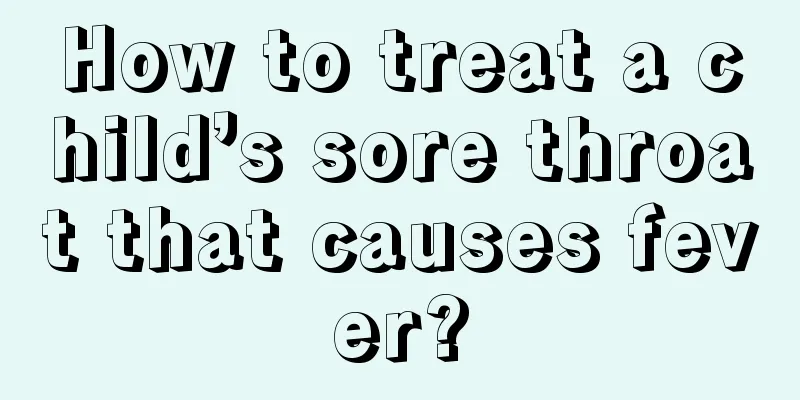How to treat a child’s sore throat that causes fever?

|
If a child's throat is inflamed, his voice will become hoarse, his throat will become very dry, and he will feel pain. At this time, the human respiratory tract is very fragile and prone to bacterial infection. It will be very painful when swallowing. However, children should still drink more water at this time. At the same time, the following methods can be taken to alleviate the condition. What should I do if my child has a sore throat and a fever? 1. The first thing to say is that repeated sore throat and fever in babies is a very common emergency in infancy. It can be intimidating for first-time parents. But it is a common problem before children are 7 years old. There are many reasons for its formation. Understanding the reasons for its formation will be very helpful in encountering similar incidents in the future and taking timely prevention measures. 2. This symptom is medically called acute upper respiratory tract infection, which is what doctors often call bacterial infection. Bacteria exist all the time, and it is possible that the child accidentally brings something carrying bacteria into the baby's body through his hands, food, air, or mouth. It could also be that you ate something that your body is allergic to. It could also be a cold. The most feared thing in the southern part of China, especially in Guangdong Province, is getting angry. There are many other possible factors. 3. Go to the hospital for diagnosis. The doctor will usually prescribe medicine, including cough suppressants, expectorants, fever-reducing drugs, and anti-inflammatory drugs. These medicines for children are generally available in regular pharmacies. Basically everyone who goes to the hospital and sells medicine knows about it. Or you can search the Internet for the above-mentioned medicines for children and the results will appear. You can keep some at home. 4. This recurring fever usually lasts for 2-3 days. Generally, after the fever subsides, it will start to rise again after a few hours. When the fever reaches 38.5 degrees, take antipyretic medicine immediately (the usage and dosage will be written on the packaging box). Drink plenty of water and give your child some warm water every 5 minutes. The purpose of drinking more water is to urinate, and each urination brings out a large amount of temperature in the body. The more you urinate, the easier it is to cool down your body quickly. Then the forehead needs to be cooled physically, that is, applying an ice bag or an ice towel. Ordinary cooling patches will not be very effective at this time. Keep wiping your body, hands, and feet with warm water. (It is not recommended to use alcohol wiping method casually. Although the effect is good, most people are not professional and do not know the dosage. In order to avoid any harm, it is recommended not to try it easily.) Use a hot towel to wipe the body, apply cold compress to the forehead, drink water to urinate, and use cooling medicine. And if you keep using the first three methods, the effect will be very obvious. 5. Remember to measure your body temperature and record it constantly. Once your temperature reaches 38.5, use emergency antipyretic drugs immediately. You should also take the medicine prescribed by the doctor on time. Let your child rest more. 6. White porridge and millet porridge are the best foods. I don’t want to eat anything else, and I can’t eat it. Then drink more warm water. If the child starts to urinate and defecate, the condition is basically under effective control. You will no longer have a recurring fever, but you still need to measure your body temperature from time to time. It is best to buy a forehead thermometer or an ear thermometer. The measurement speed is fast and the readings are very accurate. As long as the child no longer has a fever, the condition is under control. Afterwards, take the medicine prescribed by the doctor on time, eat light food, and drink plenty of water. 7. In fact, this situation can be prevented. I usually make herbal tea at home (water boiled with Houttuynia cordata is the best). Next, drink more water, less beverages, eat less fried foods and snacks, and eat more vegetables and fruits. Eat less fried food. 8. Children usually have some signs before they develop this disease. For example: if your child has a dry cough and you hear it happen three or more times a day, it means he is getting a sore throat. Dizziness, headache (if the child has a headache, it means the disease has come and will develop quickly), lack of strength in the body, no appetite, stomachache, bad breath, thick white coating on the tongue, etc. Once you notice the above symptoms. Prevention must be taken immediately. 9. Preventive measures: make herbal tea or fruit tea, and urge your children to drink more water and eat more oranges and apples. Drink white porridge in the morning, cook light dishes, drink more soup, and exercise appropriately. If these are done well, it is completely possible to effectively and timely prevent the occurrence of the disease. Pay attention to indoor ventilation and keep the bed dry. How much clothing the child wears. |
<<: What causes children to shrug?
>>: What should I do if my child has swollen lymph nodes?
Recommend
Why do babies breathe through their mouths?
I think everyone thinks that newborn babies are p...
What to do if your three-month-old baby has green poop
Every parent will be very happy and joyful watchi...
How to make bubble water to blow a lot of bubbles
Bubble water is one of many people's favorite...
What is rotavirus in children?
Rotavirus is a disease with a relatively wide ran...
How to do family rehabilitation training for children with cerebral palsy
Cerebral palsy in children is a relatively common...
What ointment is good for baby eczema?
Everyone knows that the body and skin of newborn ...
Does a large front fontanelle have any impact on a baby?
You may not be very familiar with the front font,...
Can babies drink ginger soup when they have a cold?
Can babies drink ginger soup when they have a col...
What should I do if my child has tooth decay?
Many children may have tooth decay in their daily...
Two months old baby's tongue is white
Even parents who have no experience in raising ch...
What psychological problems do children from single-parent families have? These are the 7
The psychological problems of children from singl...
Autism treatment, pay attention to behavioral therapy!
Autism, also known as autism, is a pervasive deve...
Symptoms of gastroesophageal reflux in children
Gastroesophageal reflux in children can cause gre...
What to do if your baby has a runny nose?
It is very common for babies to have a runny nose...
Are diapers harmful to babies?
Nowadays, some young parents carry a lot of diape...









